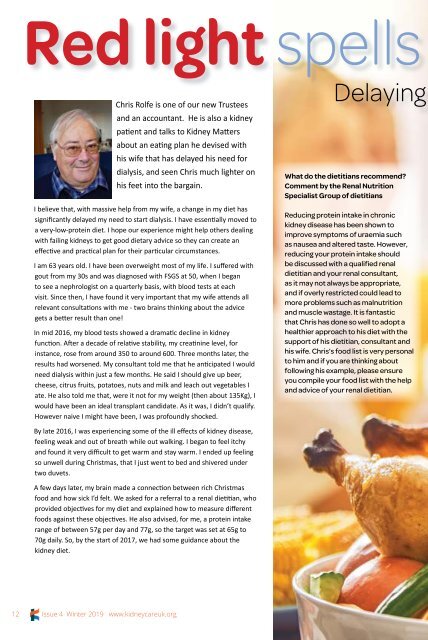Create successful ePaper yourself
Turn your PDF publications into a flip-book with our unique Google optimized e-Paper software.
Red light spells<br />
Chris Rolfe is one of our new Trustees<br />
and an accountant. He is also a kidney<br />
patient and talks to <strong>Kidney</strong> <strong>Matters</strong><br />
about an eating plan he devised with<br />
his wife that has delayed his need for<br />
dialysis, and seen Chris much lighter on<br />
his feet into the bargain.<br />
I believe that, with massive help from my wife, a change in my diet has<br />
significantly delayed my need to start dialysis. I have essentially moved to<br />
a very-low-protein diet. I hope our experience might help others dealing<br />
with failing kidneys to get good dietary advice so they can create an<br />
effective and practical plan for their particular circumstances.<br />
I am 63 years old. I have been overweight most of my life. I suffered with<br />
gout from my 30s and was diagnosed with FSGS at 50, when I began<br />
to see a nephrologist on a quarterly basis, with blood tests at each<br />
visit. Since then, I have found it very important that my wife attends all<br />
relevant consultations with me - two brains thinking about the advice<br />
gets a better result than one!<br />
In mid 2016, my blood tests showed a dramatic decline in kidney<br />
function. After a decade of relative stability, my creatinine level, for<br />
instance, rose from around 350 to around 600. Three months later, the<br />
results had worsened. My consultant told me that he anticipated I would<br />
need dialysis within just a few months. He said I should give up beer,<br />
cheese, citrus fruits, potatoes, nuts and milk and leach out vegetables I<br />
ate. He also told me that, were it not for my weight (then about 135Kg), I<br />
would have been an ideal transplant candidate. As it was, I didn’t qualify.<br />
However naive I might have been, I was profoundly shocked.<br />
Delaying<br />
What do the dietitians recommend?<br />
Comment by the Renal Nutrition<br />
Specialist Group of dietitians<br />
Reducing protein intake in chronic<br />
kidney disease has been shown to<br />
improve symptoms of uraemia such<br />
as nausea and altered taste. However,<br />
reducing your protein intake should<br />
be discussed with a qualified renal<br />
dietitian and your renal consultant,<br />
as it may not always be appropriate,<br />
and if overly restricted could lead to<br />
more problems such as malnutrition<br />
and muscle wastage. It is fantastic<br />
that Chris has done so well to adopt a<br />
healthier approach to his diet with the<br />
support of his dietitian, consultant and<br />
his wife. Chris’s food list is very personal<br />
to him and if you are thinking about<br />
following his example, please ensure<br />
you compile your food list with the help<br />
and advice of your renal dietitian.<br />
By late 2016, I was experiencing some of the ill effects of kidney disease,<br />
feeling weak and out of breath while out walking. I began to feel itchy<br />
and found it very difficult to get warm and stay warm. I ended up feeling<br />
so unwell during Christmas, that I just went to bed and shivered under<br />
two duvets.<br />
A few days later, my brain made a connection between rich Christmas<br />
food and how sick I’d felt. We asked for a referral to a renal dietitian, who<br />
provided objectives for my diet and explained how to measure different<br />
foods against these objectives. He also advised, for me, a protein intake<br />
range of between 57g per day and 77g, so the target was set at 65g to<br />
70g daily. So, by the start of 2017, we had some guidance about the<br />
kidney diet.<br />
12<br />
<strong>Issue</strong> 4 <strong>Winter</strong> <strong>2019</strong> www.kidneycareuk.org


















